Humanities and Social Sciences Awards make quantum leap in their 7th year
After a gruelling judging process of over 190 entries received, the largest number in the seven-year history of the HSS Awards, the National Institute for the Humanities and Social Sciences (NIHSS) is delighted to announce the winners of the 7th HSS Awards.
At an Awards ceremony held at the Javett Arts Centre (Javett-UP) in Pretoria on Thursday, 31 March 2022, guests, judges, Board members, publishers, members of the media, NIHSS staff and key stakeholders celebrated the winners in the Book, Creative and Digital categories of the coveted HSS Awards.
“The entries and winners of the 7th edition of the HSS Awards embody an emergence of new voices, the making of space for fresh or revisited experiences that enrich our field (and therefore humanity) and the inclusion of our histories, her-stories and their-stories previously untold, or told one-sidedly,” says NIHSS CEO, Prof Sarah Mosoetsa.
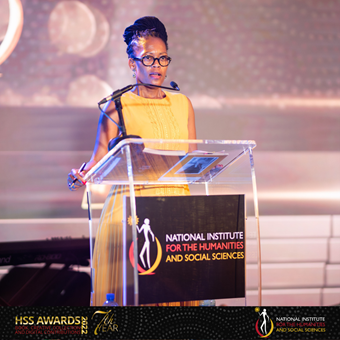
|
The task of the HSS is to colour in the spaces between extremes; to shade in the nuances and gradations missing from debates and dilemmas that are not nearly as clear-cut as they may be made out to be.
The NIHSS is also seeing a level of language diversity that is simply unparalleled. South African indigenous languages are represented more prominently than in any previous year, a promising sign that the support of the organisation is having an effect.
“But the commitment of the authors themselves to produce their work in isiZulu, Setswana and isiXhosa, among others, is a vital factor in the drive to promote thought-provoking indigenous literature,” Prof Mosoetsa adds. “A number of indigenous language authors have expressed the utmost determination to see to it that African work is given a place in the sun, both among writers and readers. The NIHSS is proud to be part of this effort.”
It is important to emphasise, however, that diversity, nuanced-ness and novelty alone will not secure anyone an HSS Award. “To be included in our short lists and be recognised among the winners, an author, artist or poet must meet the highest standards of intellectual rigour and have been willing to put in some very hard work. They must also have demonstrated real creative merit and technical dexterity that place them among the foremost creative-intellectuals in HSS scholarship.”
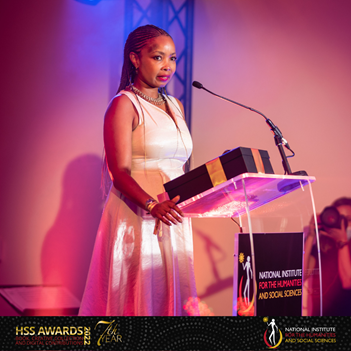
|
Pumla Dineo Gqola’s Female Fear Factory, winner of this year’s Best Non-Fiction Monograph, is a must-read that is not for the faint-hearted (who should steel themselves to read this nevertheless). The author’s interrogation of how patriarchy creates the female through a "register of violence and experiential processes" is unique. She ingeniously uses the factory as a metaphor to accentuate notions of typical patriarchal behaviour on a global stage. What Pumla brings to our understanding are the personal and social manifestations of gendered fear. In a violent society such as South Africa, with so very many instances of attacks on individuals, fear may be generalised beyond questions of gender with many males being fearful as well. Female Fear Factory looks at the ways in which women live in fear of being attacked without actually having been attacked. In a nutshell it is about the way in which women's fear is naturalised. The author fearlessly exposes the machinations of fear. She is brave and therefore we should all be brave.
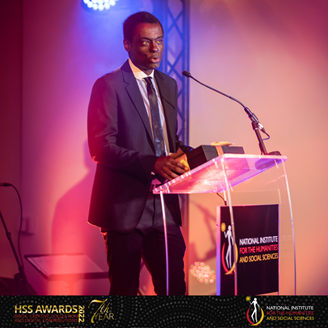
|
Thulasizwe Simpson’s remarkable accomplishment for History of South Africa: From 1902 to the Present is original in three key ways: it is based on original research in unexplored archives, it offers new interpretations of traditional debates and archives, and lastly, in terms of content, it considers subject matters which have not been explored in any other history of South Africa. The real strength of the book is the manner in which it deals with the ongoing interplay between civil society, social movements and liberation organisations on the one hand and the changing nature of the state and its policies on the other. The detailed research is truly impressive and the empirical depth is unrivalled. Here is a historian at the very crest of his craft.
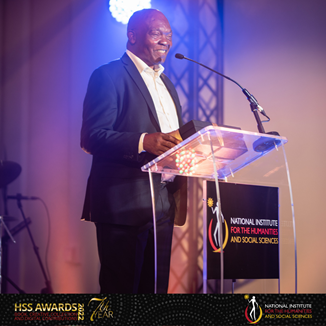
|
Mandla Langa’s magnificent novel, The Language of the Soul which won Best Fiction Novel, is an outstanding example of work that is innovative, nuanced, meticulously crafted, lovingly researched and beautifully written. It tells the story of Joseph Mabaso, the 14-year-old son of freedom fighters who have disappeared without a trace, prompting him to set out from South Africa to Lusaka, alone, in search of them. One of the many things that make this book so noteworthy is how it foregrounds the youth as ancestral carriers of courage and resilience and seekers of justice. Women, too, are seen and revealed as central to this liberation and survival work, even when it is men who appear to lead.
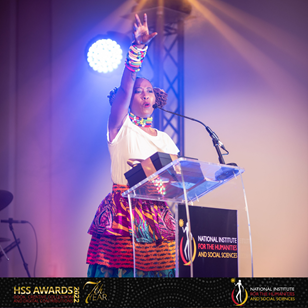
|
Wild (Im)perfections goes beyond just reflecting substantive and dynamic South African content by embracing great poems from across the world and the African continent. Of importance about these poems is that they reflect that the world, South Africa and the African continent as a whole have similar concerns that they have to deal with. These poems, written by more than 30 women, scour every subject and theme that affects women, mostly in negative ways that have been established by patriarchy over centuries.
All these voices, each unique in its own way and in as many voices as the poets that contributed to the anthology, sing in one tune like an orchestra. They bring in poetic life the strivings that are all familiar, but make them simultaneously sound both historical and freshly wounding. The poems reawaken and electrocute the conscience.
The NIHSS would like to congratulate the winners of the 7th HSS Awards. We honour the outstanding, innovative and creative contributions that are dynamising, advancing and transforming the HSS. The Institute also extends its appreciation to all who contributed to making this year’s Awards possible.
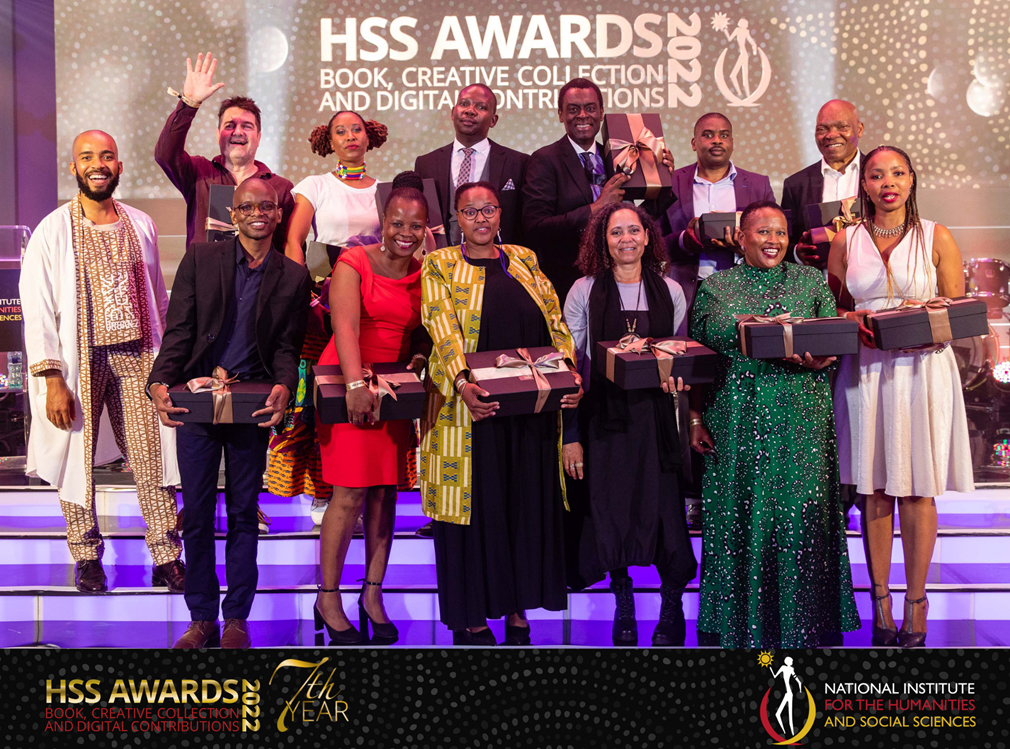
|
THE COMPLETE LIST OF THE HSS AWARD WINNERS 2022:


ENDS.
Follow us on our social media platforms for updates:
Twitter: @iNIHSS
Facebook: NIHSS
ABOUT THE HUMANITIES AND SOCIAL SCIENCES AWARDS
The HSS Awards are open to all academics, curators and artists of various forms of creative work who are based in South Africa working to advance the HSS. Through these awards, the NIHSS provides an enormous contribution to the national dialogue about the importance of the HSS for the country as a whole.
A key aim of the annual Awards is to give special recognition and celebrate those members of the HSS community who are undertaking the necessary work of creating post-apartheid and postcolonial forms of scholarship, creative and digital humanities productions. The Awards do this by honouring outstanding, innovative and socially responsive scholarship, as well as digital contributions.
The HSS Awards provide an opportunity to cast a celebratory limelight to those intellectual-creative workers whose work often goes unnoticed both in the academy and society at large. These include the tenacious authors and playwrights, the risk-taking poets and artists; and curators and publishers who ensure that we can all view and enjoy the HSS boundary-spanning outputs.
The HSS Awards’ aim is to give life to the ideas expressed in the Humanities Charter and increase the recognition afforded to book and creative outputs; reposition these scholarly contributions as having public-value; and increase appreciation and the role they play in sustainable social cohesion and the re-imagining of the HSS.
The NIHSS is an entity of the Department of Higher Education and Training (DHET).



